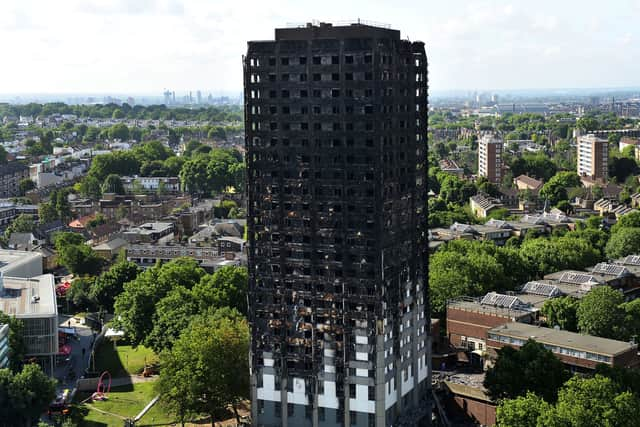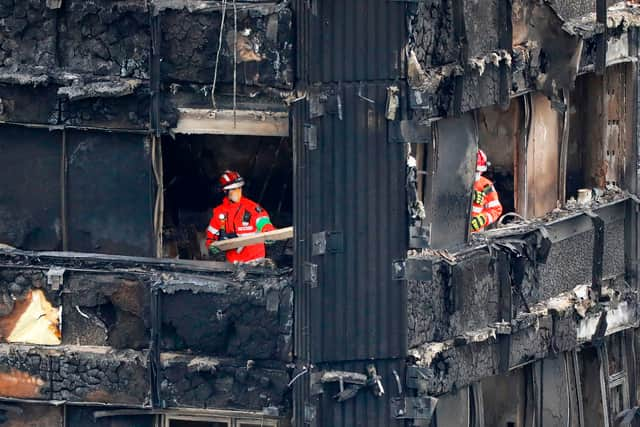Grenfell Tower fire: up to a dozen firefighters who tackled 2017 blaze ‘diagnosed with terminal cancer’
and live on Freeview channel 276
Multiple firefighters who tackled the Grenfell fire in 2017 have since been diagnosed with terminal cancer. An investigation by the Mirror has uncovered that firefighters, some as young as 40, have been diagnosed with cancers believed to include leukaemia and digestive cancers.
The Grenfell fire killed 72 people in London in 201 and was one of the worst accidents in modern history. The public inquiry revealed that “each and every one of the deaths that occurred in Grenfell Tower, on the 14 June 2017 was avoidable.”
Advertisement
Hide AdAdvertisement
Hide AdFirefighters and survivors of the blaze are being asked to undergo medical screenings as connections between those who fought the fire and cancer diagnosis are being investigated. Here’s everything you need to know about what the investigation has uncovered and what Grenfell firefighters have said.
When was the Grenfell fire?
In the early hours of 14 June 2017 a fire broke out in the 24-story Grenfell Tower. The fire initially broke out in a kitchen on the fourth floor but the flames quickly spread throughout the building, covering all four sides of the exterior. One of the worst accidents in modern history, 72 residents of the tower block died, with a further 70 left with injuries.


What has happened to the Grenfell firefighters?
An investigation by the Mirror has uncovered that up to a dozen firefighters who tackled the Grenfell fire have been diagnosed with incurable cancers, believed to include leukaemia and digestive cancers, but other illnesses have been mentioned including kidney failure, heart disease and strokes. A fire service source told the newspaper: “We are expecting some really depressing data to be revealed soon. It’s shocking.”
Up to 1,300 firefighters were involved in the Grenfell fire response, with some left running out of air, sitting in their contaminated suits for more than 10 hours and waiting up to six hours in the building’s smoke-logged basement.


Advertisement
Hide AdAdvertisement
Hide AdResearch by the Fire Brigades’ Union and the University of Central Lancashire this week found that firefighters who notice soot in their nose or throat are twice as likely to be diagnosed with cancer and twice as likely to be diagnosed if they stay in their PPE for more than four hours.
Riccardo la Torre, Fire Brigades Union National official, told the Mirror: “This vital research proves that firefighters are suffering and dying from cancer, strokes, heart disease, and mental ill health as a result of going to work and protecting the public.”
David Badillo was the first firefighter to enter Grenfell Tower. He said: “On a personal level it’s very worrying. I’ve got two young kids and I want to see them grow up.” Adding: “I’ve been scanned and nothing’s come up, thankfully, so far, but you don’t know what could happen in the future.”
Firefighters are being asked to undergo medical screenings as connections between those who fought the fire and cancer diagnosis are being investigated.
Has the Grenfell fire inquiry finished?
Advertisement
Hide AdAdvertisement
Hide AdThe Grenfell fire inquiry concluded in November 2022 after 400 days. It found that “each and every one of the risks which eventuated at Grenfell Tower on that night were well known by many and ought to have been known by all.” And concluded that “each and every one of the deaths that occurred at Grenfell Tower on June 14, 2017, was avoidable.”
Following the findings, Grenfell United, a group of survivors and bereaved families, said the end of the inquiry was a reminder “that we continue to live our lives knowing the evidence has been uncovered, and yet, there’s no change - no accountability, no charges.”
The full report has not yet been published and is expected to be available in 2023.
Comment Guidelines
National World encourages reader discussion on our stories. User feedback, insights and back-and-forth exchanges add a rich layer of context to reporting. Please review our Community Guidelines before commenting.
